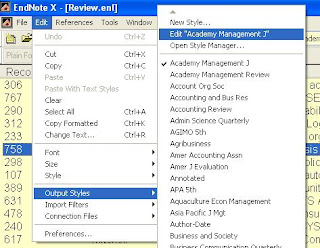It's been bugging me - how does transfer of knowledge link with social capital?
One of our first year PhDs had a problem with
Endnote. If you import a reference and it comes with capitals, then how can you automatically change it so in your references it
isn't capitals? He came to ask me as one of the second years in the room. (This is an open plan office with desks for around 30 people, around 15-16 of whom are students and the rest are academics.) I knew it had to be something with the template but didn't know what, so I faffed about a bit, looking on templates that did and didn't change the CAPITALISATION but then went back to what I was doing.
First year student returned an hour later having worked out how to do it and told
me.
So there's a transfer of knowledge -
in one minute I
knew, and so did the third year student who over heard. There's value from knowing and being in the same room as that first year and we saved two more hours of two other students searching independently. Why did he come and ask? Probably because he knew in the first place that other students are approachable, because the room lends itself to moving around casually and asking, because he suspected I might already know, which he could guess from already having chatted over coffee. See
coffee video - he's often at coffee with us. So sharing coffee builds social capital and shares learning.




